How to stay young and healthy, even when you’re growing old

Everybody knows that with age comes decline. But why is that? Why does one smoker easily live to be 98, while another health freak doesn’t even make it to 60? And how can we provide the ever-growing group of senior citizens with more healthy years? In the Northern Netherlands, top researchers and 167,000 inhabitants are striving to find the answer.
Renowned research institute ERIBA is unraveling ageing at a cellular level
Ageing is a disease
Who wouldn’t want to grow old in good health? Living longer is not the problem: in the last 150 years, the average life expectancy in Western Europe has increased by two years every ten years. And it does not seem to be slowing down. But as we get older, we often develop age-related diseases, such as cancer, diabetes, Alzheimer’s and cardiovascular diseases. 'Most people don’t necessarily want to get older; they mainly want to stay healthy longer,' according to Gerald de Haan. 'And someone who stays healthy longer automatically lives longer.'
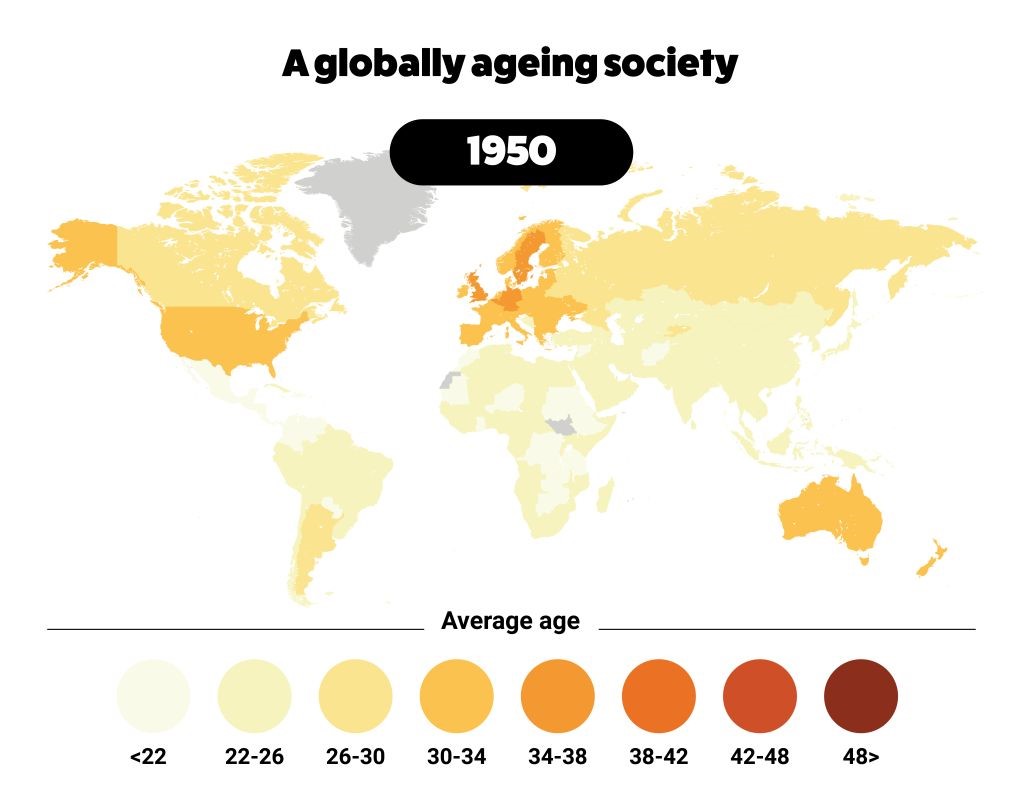
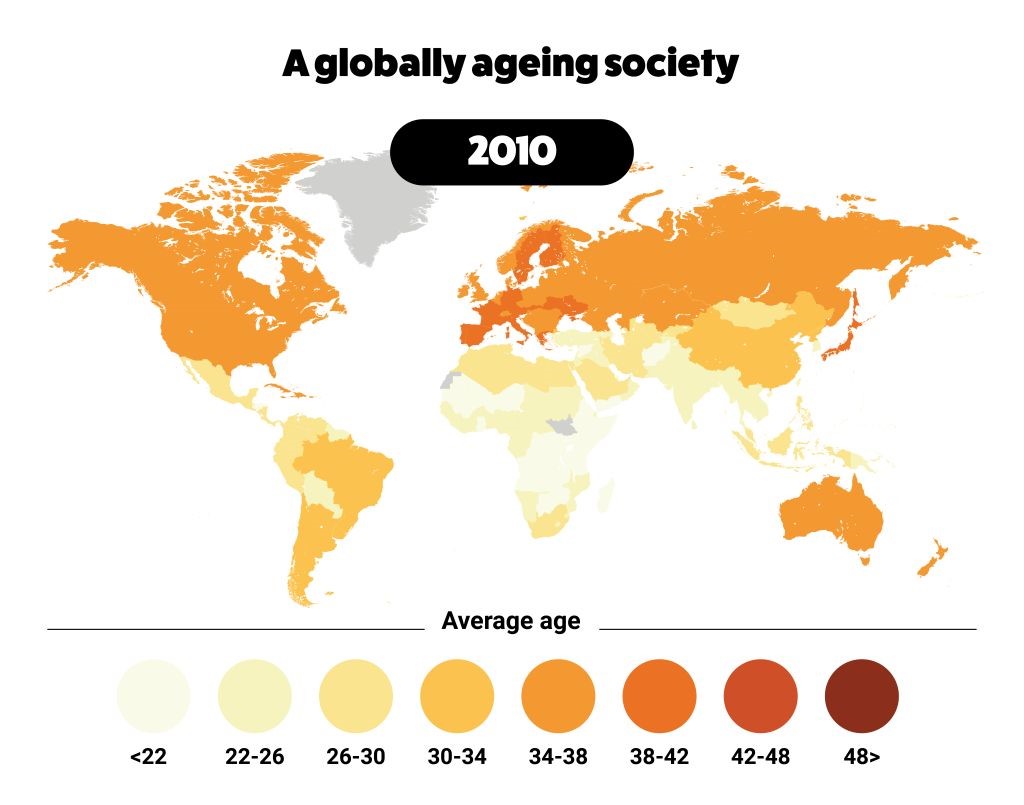
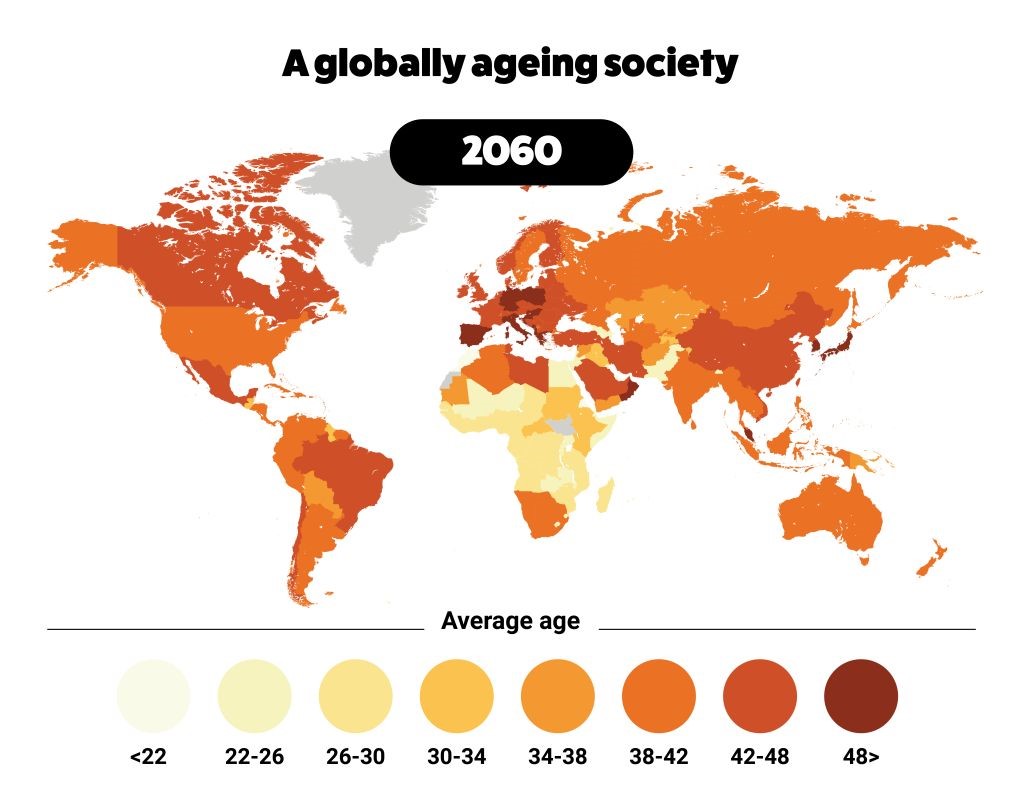
De Haan is Scientific Director of the ERIBA, the European Research Institute for the Biology of Ageing. There, top researchers from around the world are carrying out fundamental research to discover what happens in cells as someone gets older. 'We are able to attract the best because we are located next to the second-largest hospital in the Netherlands, because we offer splendid facilities, and because both the authorities and institutes in the region have been focusing on Healthy Ageing for years.'
There are currently thirteen groups at ERIBA studying the mechanics of ageing with the goal of finding ways to impact it. De Haan tell us: 'Our mission is to contribute to adding one to three additional healthy years. This provides us with a happier life and saves the Dutch treasury up to one billion euros per year in healthcare costs.' The researchers collaborate closely with companies and knowledge institutes from around the world. There's lots of interest. In many parts of the world, healthcare costs have skyrocketed due to the ageing population and there are fewer people to take care of the sick and the elderly.
Understanding how we age
'A lot about ageing is still unclear,' de Haan says. 'Our bodies have an incredible ability to keep themselves healthy. Throughout our bodies, damaged cells are continually being removed and replaced by new ones. To do this, the DNA of the cell is scanned, duplicated and passed on to two daughter cells. Just like a popular CD that is passed around the classroom to be copied, the reproduction of the cells will deteriorate over time. You can see this, for example, when someone gets a sore. When a child gets a small sore, it heals in no time, but with older people it takes much longer or it may not heal at all. We are still unsure of why duplication deteriorates over time.'
The ERIBA researchers patiently study the cells’ various ageing mechanisms. 'We suspect that there are mechanisms that cause various problems in different tissues, and these same mechanisms might cause various age-related diseases. You often see that elderly people do not just suffer from one disease, but are battling several health issues simultaneously. Those who remain healthy are often very healthy in general. These people seem to have or do something that protects them from the effects of ageing. We expect that, by intervening in the ageing mechanisms, we will not just be treating one disease, but the entire ageing process.'
Living longer with hunger
One of the mechanisms that has an effect on various age-related diseases is the metabolism. 'We have known for a long time that a diet with a lot fewer calories, but sufficient vitamins and minerals, leads to a longer and healthier life,' says ERIBA researcher Cor Calkhoven. 'In 1937, researchers proved this in a study with rats, and we later saw the same results with worms, fruit flies, mice and monkeys.' In various animals, and presumably also in humans, a 25% reduction in calories increases a healthy lifespan by about 20%.
That's great, but someone who eats 25% fewer calories will also be hungry all the time. Calkhoven, Professor of Gene Regulation, found a different approach. By flipping a genetic switch in mice, they produced much less of the protein C/EBP-beta-LIP. This is the protein that makes your body store fat when you eat. The mouse with less LIP burns more fat than the unmodified mice. In collaboration with the German Leibniz Institute On Aging in Jena, Calkhoven researched the effects on the mice's health in an extensive study.

Losing the beer belly
'The modified mice ate the same food as the mice in the control group,' says Calkhoven. So they should not have been hungry. But the researchers observed that they did live longer and also remained healthier. At a higher age, the modified mice were just as mobile and agile as young mice. They remained thinner, developed cancer or diabetes less frequently, and had lower levels of fat in their liver. 'We know that storing fat - noticeable with many older human males by their "beer belly" - is not healthy,' Calkhoven explains. 'Our research shows that gene switching affects various processes that switch on as we get older.'
The next step is to find a drug that has the same effect as gene modification. 'With support from the local government, we started collaborating with the renowned German Fraunhofer IME ScreeningPort institute. Together with them, we are currently testing promising drugs. It is a matter of debate whether you should call it a drug. But whatever it is called, it would be great if we could develop a pill that allows you to maintain normal eating habits, yet gives you all the health benefits of a calorie-restricted diet.'
Disposing of damaged cells
A little further down in the building, in a different lab, Italian researcher Marco Demaria has set his sights on the so-called senescent cells. Radiation from the sun, air pollution, stress; all of these things damage your cells. A cell can then do just one of three things. The cell can repair itself and live on, the cell can die, or the cell can continue its life with damaged DNA. Sometimes these damaged cells divide very quickly and become cancerous cells. Whole other damaged cells do not divide at all. But these "senescent cells" remain active and send mixed signals to adjacent cells.
'Everything seems to be pointing more and more toward ageing as a disease in which senescent cells play an important role. Ageing may cause diabetes and arthritis in one person, cancer in another, and yet another person may develop cardiovascular disease and Parkinson’s when they get older,' Demaria says. 'By learning how to cleverly dispose of these senescent cells, we hope to be able to affect all those diseases simultaneously.'
Clean-up shot against ageing
Developments in this field are fast. In 2010, Demaria, who was working in the United States at the time, and his colleagues proved that mice aged less if you dispose of the senescent cells. The American company that originated from this, has now treated their first test patients for arthritis in the knees with a ‘senescent killer’. And next year, Demaria hopes to start testing a drug that counteracts the side effects of cancer treatments.
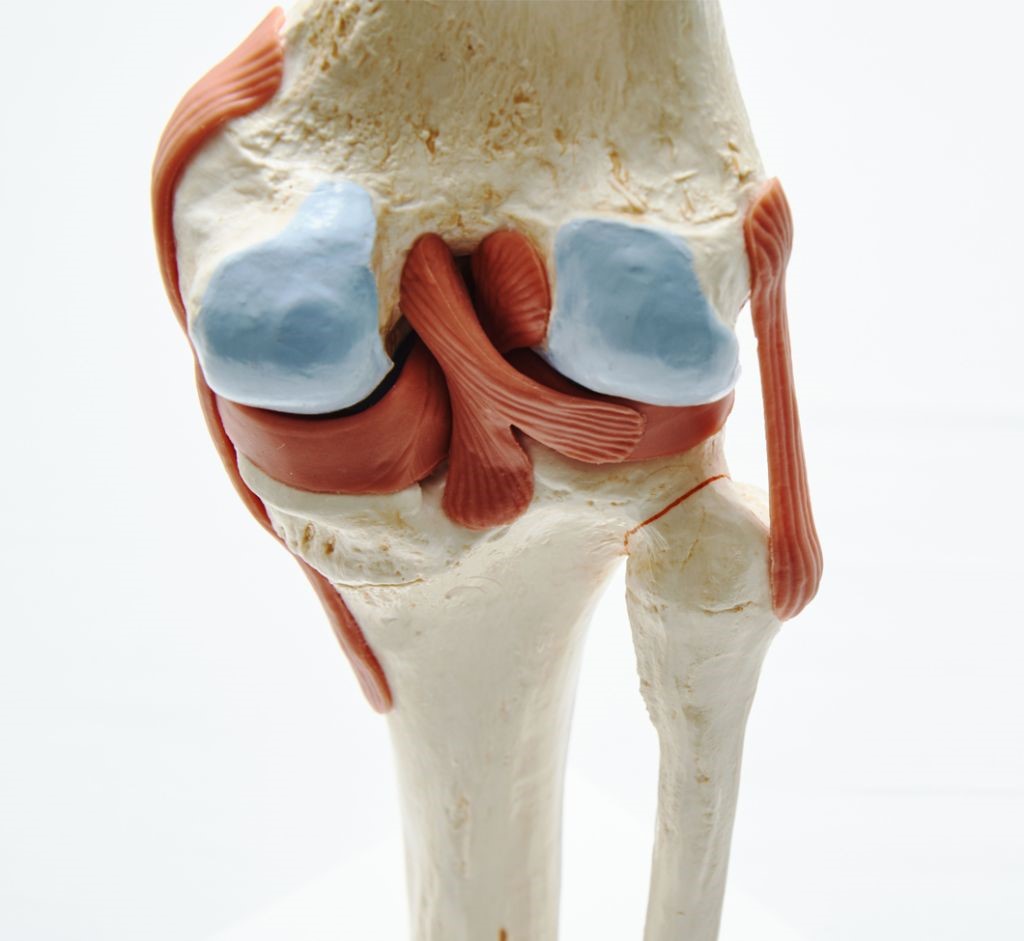
'If there is anything that causes a lot of damage to the DNA and thus creates senescent cells, it is radiation therapy and chemotherapy. Patients suffer all kinds of unpleasant side effects, such as nausea, tingling hands and fatigue. We hope to be able to counteract all of those side effects at the same time by disposing of the senescent cells.' He is developing this drug at Cleara Biotech, a company where ERIBA and the universities of Utrecht and Graz (Austria) collaborate.
Demaria suspects that destroying senescent cells may also have long-term benefits. 'People who went through cancer treatment at a young age often begin suffering from age-related diseases at the age of fifty-five instead of the average age of seventy-five. We can probably prevent this premature ageing by disposing of the senescent cells.' Looking further into the future, Demaria envisions everyone above the age of forty - even people who have never gone through cancer treatment - getting a ‘clean-up shot’ every few years. 'To stay healthy longer.'
Postponing age-related disease
Fully developing Demaria’s clean-up shots will take years. And the drug that Calkhoven is researching to slow down the protein that regulates fat storage, is not available yet either. But de Haan is convinced that we will eventually get these age retardants. 'I sometimes notice people becoming uncomfortable when I talk about intervening in the ageing process,' says de Haan. 'But everyone who applies sunscreen or takes statins, is effectively already using an anti-ageing drug. We don’t have eternal life. However, we can postpone and reduce the period in our life that we are afflicted with age-related diseases. And this will make our lives a lot more enjoyable.'
A treasure trove of information
There has been a focus on healthy ageing in the Northern Netherlands for years now. Not just among scientists, policymakers and companies, but also among the local inhabitants. Over 30 years about 10% of the Northern population are providing body substances and data about their lifestyle. This results in a treasure trove of information. This data can help us discover early indicators of diseases and find out exactly what helps us to stay healthy longer.
Every 5 years, more than 167,000 individuals, both young and old, give body substance samples, such as urine, blood, DNA, stool and hair for the TopDutch project Lifelines. These materials are stored at -80 °C (-112 °F) in a freezer the size of a gym. At those same intervals, everyone's lung function and blood pressure are measured, an ECG is taken, and the participants undergo a cognitive test. Every year and a half, the participants fill out extensive surveys to provide information about health issues, nutrition, exercise, smoking, stress, income, social interaction and even pets.
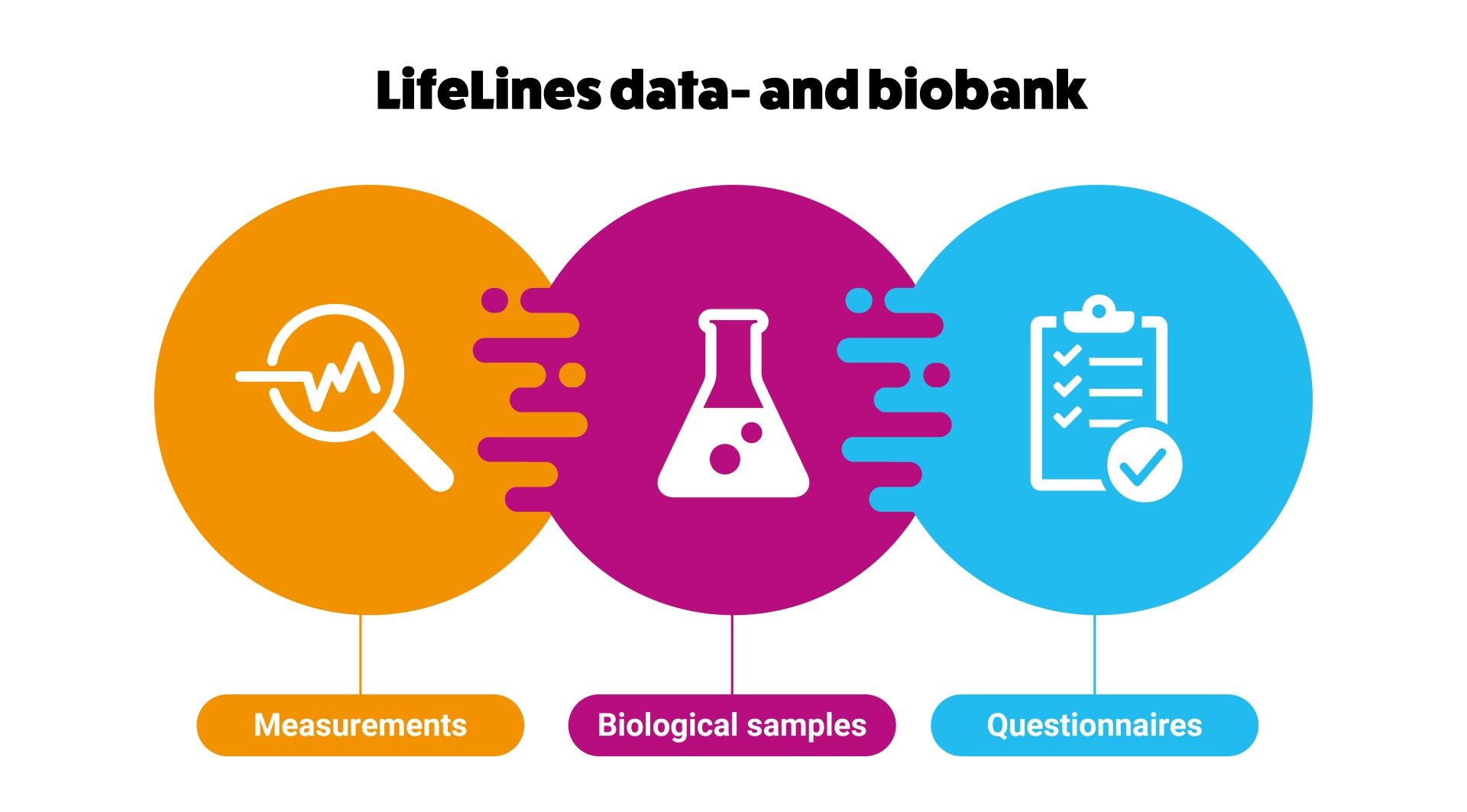
'We ask quite a lot of our participants,' Aafje Dotinga admits. She is the Scientific Manager at Lifelines and a participant in the study. 'Luckily, people are content to stay here and happy to participate. The information they receive about their own health is important, and the participants are also genuinely motivated to further our knowledge about healthy ageing.'
And so they do. 'Thanks to all these people dutifully sharing data about their health, we have a really unique treasure trove of information,' Dotinga says. 'Unique, because our cohort is so large and a cross-section of the inhabitants of the Northern Netherlands is participating; the healthy as well as the sick. Also unique because of the diversity of data we require and because we can conduct additional studies with sub-groups of the participants. And because we follow people of all ages for thirty years.' This information will allow regional policymakers to create and monitor their health policy. Researchers from around the world also love to use the data from LifeLines to further develop their knowledge about ageing.
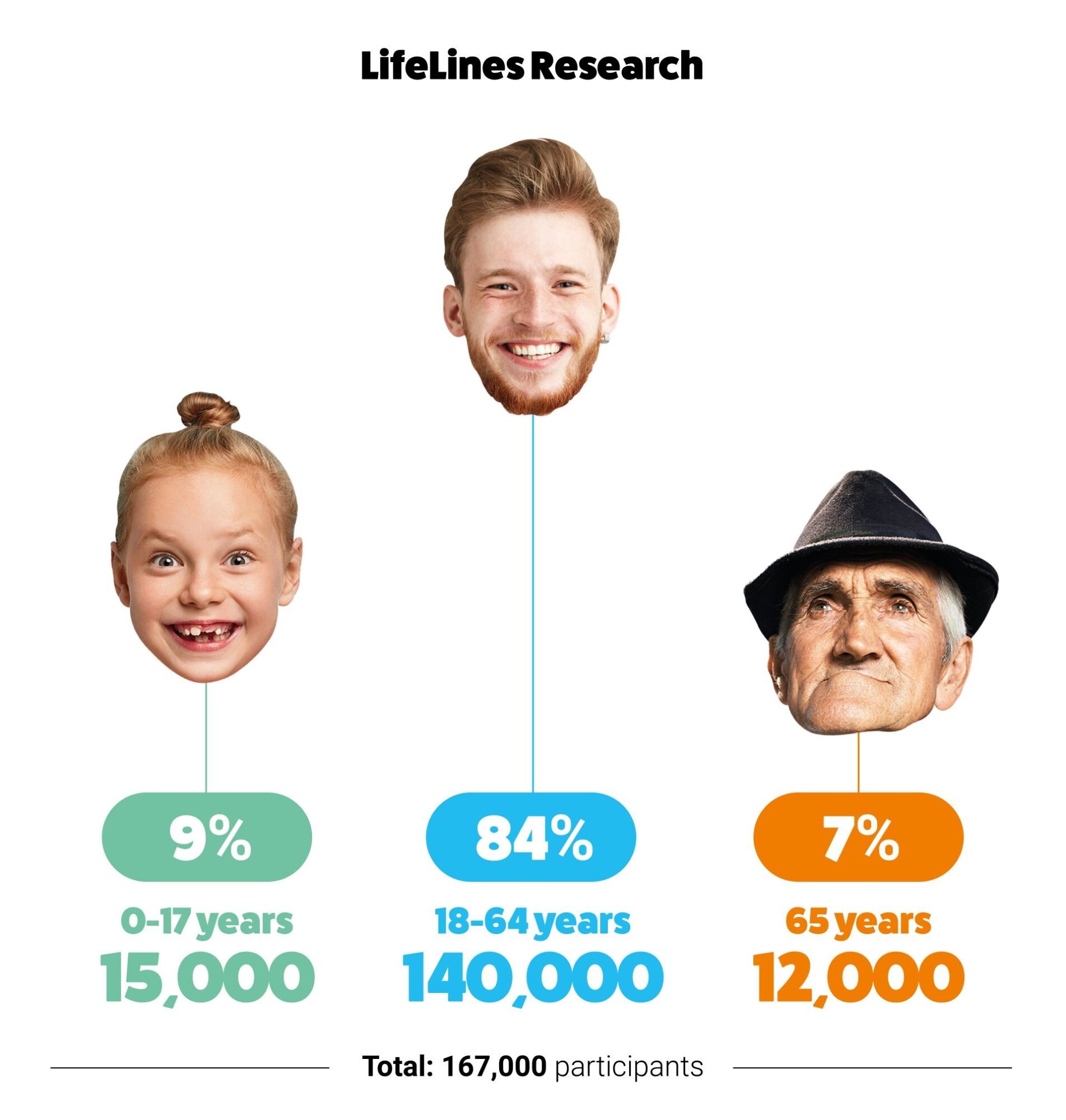
Early signals
'As the study continues, the data becomes more and more valuable,' says Dotinga. 'We are now starting the third round of collecting body materials and carrying out analyses. If we discover that someone is sick, we can look at previous analyses to look for signals that this person was developing a disease.' A simple light measurement on the skin during the first round of Lifelines, for example, proved to be a good indicator of who would have developed diabetes by the second round. Good news for general practitioners, who, in just ten seconds, with the help of the AGE reader, can now assess who runs a higher risk of developing this chronic disease. Other studies look for early indicators of depression, dementia, cardiovascular disease and lung cancer, etc.
Scientists can also use the data collection to check who did not get sick, despite the presence of early indicators. 'Because we know what these people eat, where they live, if they smoke, and if they exercise regularly, we can deduce what would be good preventive measures.'
Most extensive microbiome study in the world
Professor Sasha Zhernakova is looking for the answer in the microbiome, the composition of bacteria, viruses and microbes in fecal matter. 'We know that the microbiome has a big influence on health. Our team discovered, for example, that not only our genes, but also our microbiome, determine whether or not we are able to digest dairy products. Lactose intolerant people can actually drink milk if they have enough of a certain lactic acid bacteria in their microbiome,' says Zhernakova. 'We also know that the microbiome can have a strong influence on the effectiveness of drugs, such as statins, anti-depressants and anti-cancer drugs. We want to unravel the interaction between microbiome, genome and health.'
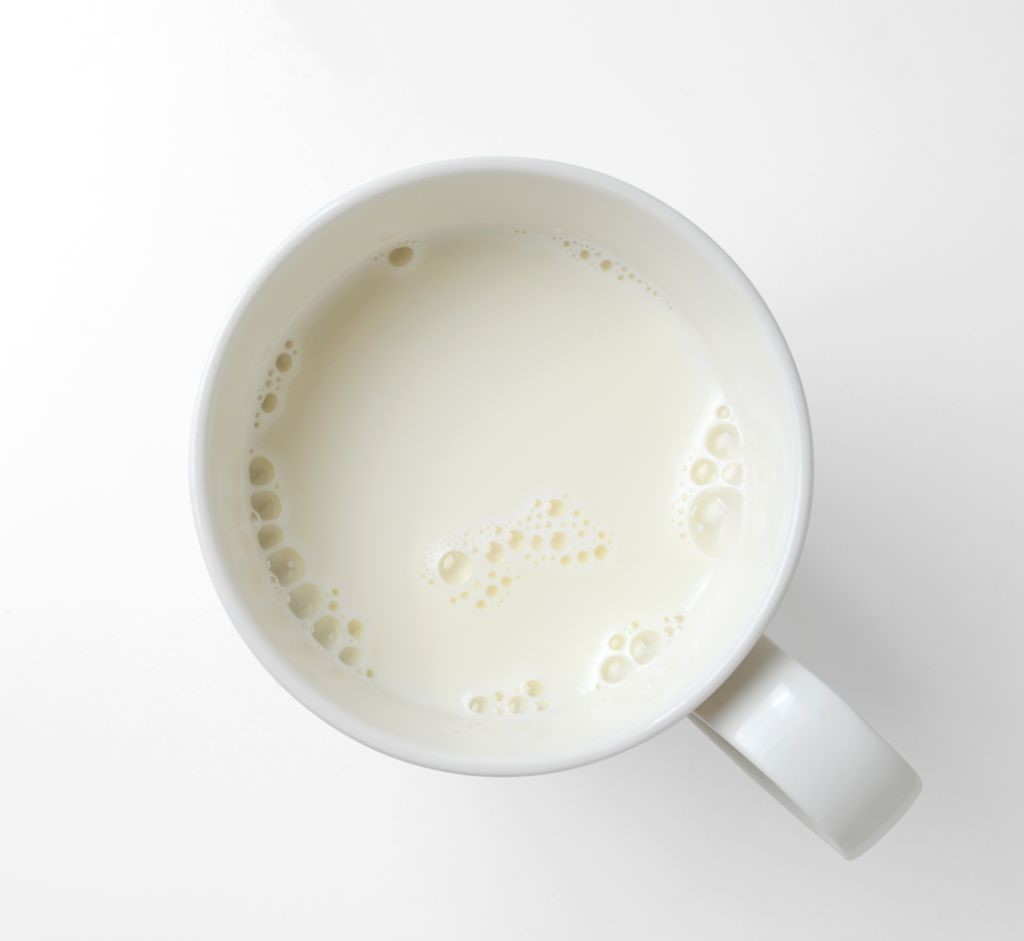
For this reason, the microbiome team at Lifelines collected DNA and stool samples from more than 10,000 individuals. 'This is the most extensive microbiome study in the world,' according to Zhernakova. In a different study, Lifelines NEXT, they monitor 1,500 mothers and their babies to study how the microbiome is formed at the beginning of our life cycle and how it affects allergies and chronic diseases later on. 'Sleep, stress, nutrition, all the environmental factors greatly affect the composition of our microbiome. Which is good news; you can’t really alter your genes, but you can modify your microbiome.'
Zhernakova ponders: 'I hope that we will be able to give tailor-made advice in the future. We all know what is healthy and what is unhealthy, but it is difficult to be perfect. I think that in the future we will be able to tell you what you should prioritize, based on your genes and microbiome. For one person it could be to quit smoking, another should get lots of exercise, and for another it could be steering clear of certain foods. These personalized recommendations will have a huge effect on our health.'
CONTACT
Join TopDutch
So what will be your next move? How will your company join the fight for a healthier population? Contact our network of knowledge-intensive institutions and innovative and entrepreneurial companies. You’ll soon see for yourself how quickly things get done here in the Northern Netherlands.
Learn more about TopDutch!
"*" indicates required fields
